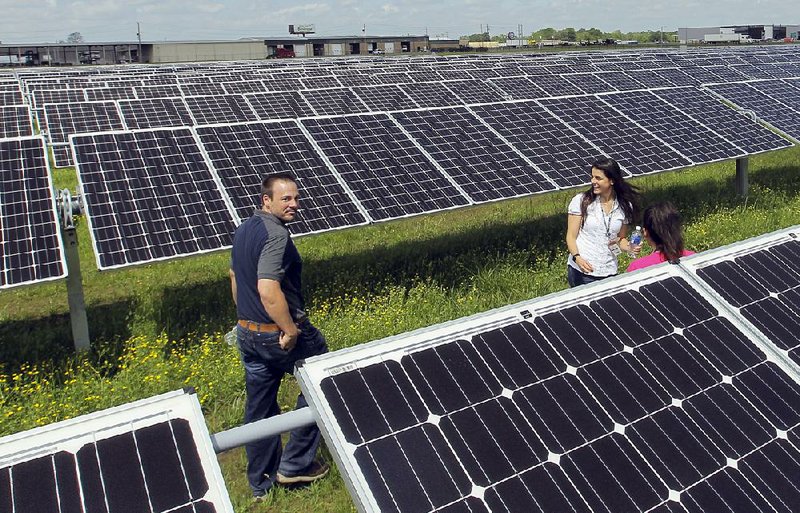A new tariff on imported solar products is expected to raise the price of solar projects in the United States and potentially curb demand, but shouldn't prevent solar power from continuing its fast-paced growth, solar officials in Arkansas said last week.
President Donald Trump's administration early last week instituted an import tariff of up to 30 percent on solar power equipment that is manufactured abroad. The tariff will decline over time and last only four years.
The rapid collection and hoarding of solar equipment in anticipation of a tariff has raised prices already, Arkansas officials said.
While the price of solar panels will get even higher, the price of solar projects should still be advantageous to customers who often look to solar as a way of reducing electricity costs, said Josh Davenport, co-founder of Seal Energy Solutions in North Little Rock.
"We believe as our labor prices continue to get better and as the cost of energy continues to increase, we see the tariff as ultimately nonconsequential," Davenport said.
At Seal Energy Solutions, he said, the company will try to be more efficient with how it works to prevent passing the price increase down to customers, such as vertically integrating more of the solar installation process.
Bill Halter, owner of Scenic Hill Solar in Little Rock, echoed Davenport. Davenport's company installs projects mostly for residential customers, and Scenic Hill Solar installs projects mostly for commercial and smaller utility customers.
Both said large utility customers, for whom the price of a solar panel comprises a larger proportion of overall project costs, would be more affected by the tariff.
Kurt Castleberry, director of planning and marketing operations for Entergy Arkansas, said the utility didn't know how the tariff would affect business.
"We don't know at this time," he said. "Solar firms will take the tariff into account when they provide EAI [Entergy Arkansas] proposals for solar facilities."
The utility has invested in solar projects in recent years, including an 81-megawatt array just outside of Stuttgart and a 100-megawatt array just outside of Lake Village, because of the advantageous solar prices.
The price of solar panels and installations has tumbled so much in recent years that Arkansas utilities have announced seven solar projects since 2015. The state previously had none.
The low prices are the result of cheaper imports from growing international companies, Halter said.
Trump's decision is his response to the International Trade Commission's finding last October that imported solar panels were hurting U.S. manufacturers. U.S. company Suniva Inc. filed the complaint last year, and German manufacturer SolarWorld AG signed on as a co-petitioner.
The trade commission recommended a tariff of up to 35 percent on imported solar panels, depending on the volume of panels ordered. Suniva, which has filed for Chapter 11 bankruptcy protection, had asked for a higher tariff but told The Associated Press last Monday that the announcement was a "step forward."
Since that case was filed, many companies purchased large quantities of solar equipment in anticipation of prices rising, Halter and Davenport said. The few U.S. manufacturers of solar equipment subsequently sold out or sold significant inventory, thereby increasing prices even before the tariff announcement, Halter said.
In the long run, officials expect more manufacturing to take place within the United States, increasing the supply and lowering the prices. They will likely be foreign companies opening up factories on U.S. soil, Halter said, noting that China-based Jinko Solar plans to open a factory in Jacksonville, Fla., that will employ 800 people using a $23 million incentive package from the city.
The fast-growing solar industry buys about 80 percent of its equipment from abroad, officials said.
Nationally, groups had varying responses to Trump's decision.
SolarWorld Americas, located in Portland, Ore., said it appreciated the work of the Trump administration in the tariff decision.
"We are still reviewing these remedies and are hopeful they will be enough to address the import surge and to rebuild solar manufacturing in the United States," the company said in a news release. "We will work with the U.S. government to implement these remedies, including future negotiations, in the strongest way possible to benefit solar manufacturing and its thousands of American workers to ensure that U.S. solar manufacturing is world-class competitive for the long term."
The Solar Energy Industries Association predicted in a news release that the tariff would result in the loss of 23,000 jobs in the United States.
The tariffs "will create a crisis in a part of our economy that has been thriving, which will ultimately cost tens of thousands of hard-working, blue-collar Americans their jobs," association President and CEO Abigail Ross Hopper said in the news release.
The solar industry employs more people in the United States than fossil fuels, nuclear and wind combined, according to the U.S. Department of Energy. Solar employs 373,807 people, according to the department's 2017 U.S. Energy and Jobs Report. Wind employs 101,738 people, nuclear employs 68,176 and fossil fuels (coal, natural gas, oil/petroleum and advanced gas) employ 187,117.
Metro on 01/29/2018

